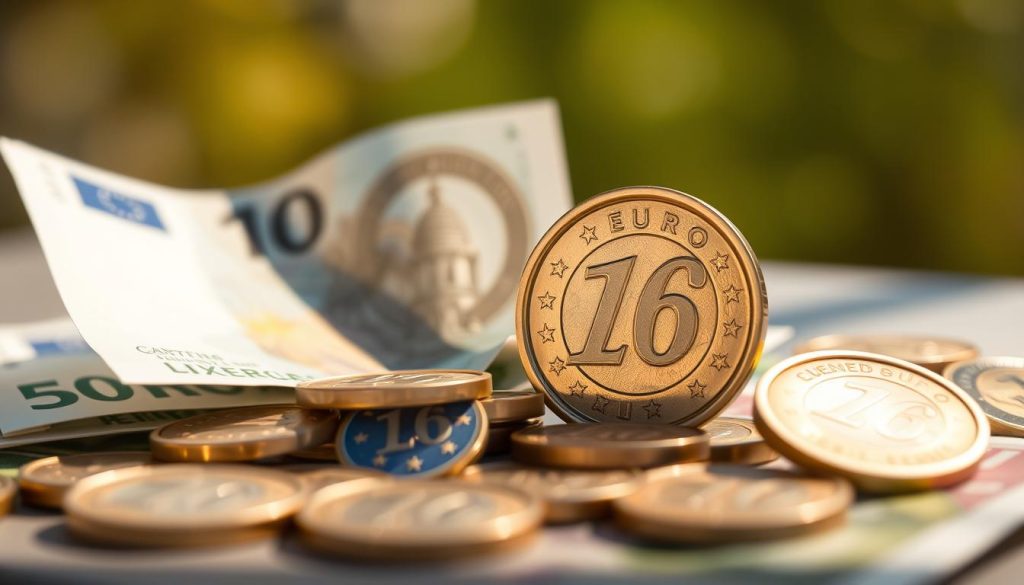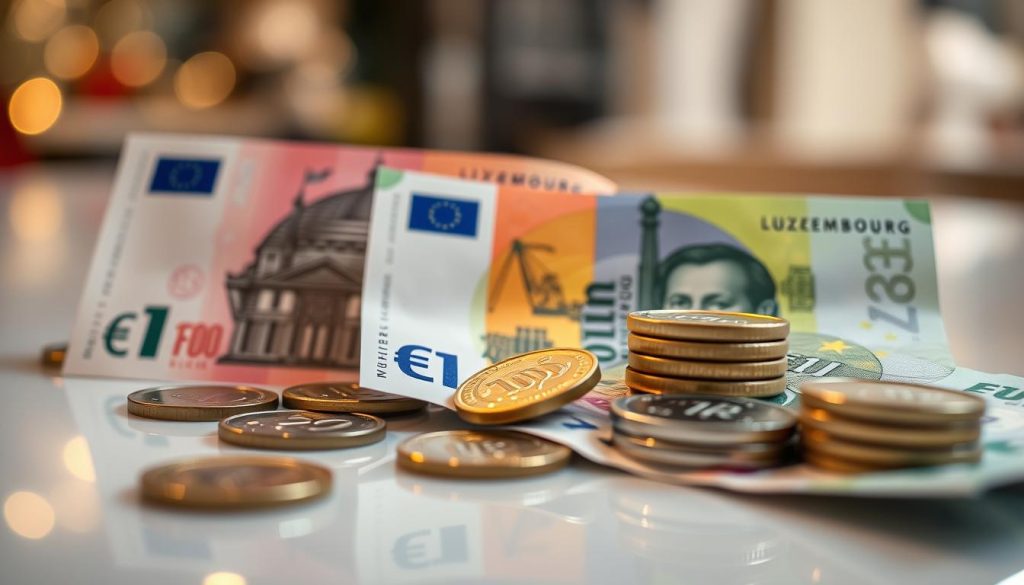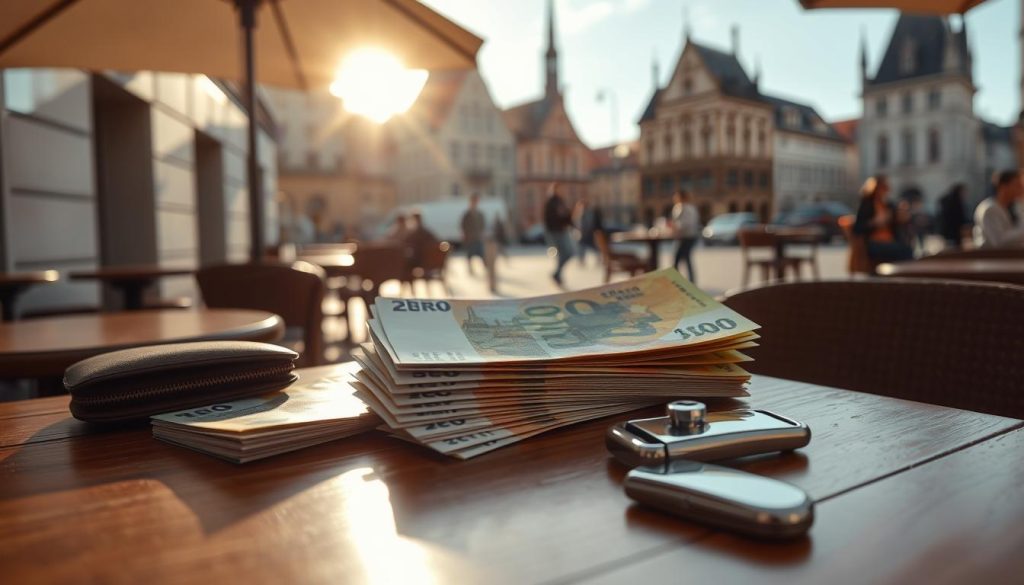Did you know that Luxembourg’s population more than doubles during weekdays due to cross-border workers? This small yet vibrant country is a hub of activity, blending its rich history with a modern financial infrastructure. Whether you’re exploring the charming streets of Luxembourg city or marveling at its fairytale castles, managing your money effectively is key to a seamless experience.
This guide is your go-to resource for understanding the currency and payment methods here. From the euro’s characteristics to practical tips on avoiding fees, we’ve got you covered. Learn about local ATM networks, digital payment options, and how to make the most of your finances while enjoying this unique destination.
With its European charm and efficient systems, Luxembourg offers a travel experience like no other. Let’s dive in and ensure your trip is as smooth as possible!
Understanding Luxembourg’s Currency Landscape
The country’s currency history reflects its modern financial prowess. In 1999, the euro was introduced as book money, replacing the Luxembourgish franc. By 2002, it became the official cash currency, streamlining transactions across the region.

This transition simplified money management for locals and visitors alike. The euro’s adoption also aligned the country with the broader European Union, fostering economic stability and growth.
Euro Adoption and Historical Transition
The shift from the Luxembourgish franc to the euro was a pivotal moment. It marked the country’s integration into the eurozone, a group of 19 European nations sharing the same currency. This move eliminated exchange rate hassles and boosted cross-border trade.
Unique Characteristics of the Euro Coins
Luxembourg’s euro coins stand out with their distinctive designs. Each coin features the profile of Grand Duke Henri, a nod to the country’s rich heritage. The reverse side showcases the EU map, symbolizing unity and cooperation.
- 1, 2, and 5-cent coins highlight the Grand Duke’s portrait.
- 10, 20, and 50-cent coins feature intricate details of his profile.
- 1 and 2-euro coins combine the Grand Duke’s image with the EU map.
These designs not only reflect the country’s identity but also make its currency a collector’s item. Whether you’re in Luxembourg city or exploring its countryside, these coins add a touch of local charm to your travels.
Navigating Payment Methods in Luxembourg
When visiting Luxembourg, understanding how to pay for goods and services is essential for a smooth trip. The country offers a mix of modern and traditional payment options, making it easy to manage your money while exploring.

Card payments dominate in urban areas, with over two-thirds of transactions conducted electronically. This is thanks to the advanced banking infrastructure, which supports seamless card usage in shops, restaurants, and hotels. However, cash is still preferred in some rural spots and smaller establishments like local markets or street vendors.
Card Payments vs. Cash: What to Expect
Using cards is convenient and widely accepted in cities. Most places accept major credit cards like Visa and Mastercard, though American Express may incur extra fees. Contactless payments are also common, especially for small purchases under €25.
In contrast, carrying some cash is advisable when visiting rural areas or smaller businesses. It ensures you’re prepared for places that don’t accept cards. Additionally, having euros on hand can help you avoid foreign transaction fees or unfavorable exchange rates.
By understanding these payment methods, you can save both time and extra charges during your travels. Whether you prefer the ease of cards or the reliability of cash, being prepared will make your trip hassle-free.
How to Get Cash in Luxembourg
Getting cash while traveling can be a breeze if you know the right methods. In this country, you’ll find several convenient options to access your money, whether you’re in the bustling streets of Luxembourg city or exploring quieter areas.

ATM Withdrawals and Local Banks
ATMs are the most accessible way to get cash. Major banks like Raiffeisenbank, BIL, and BNP Paribas offer reliable services with competitive exchange rates. Most ATMs accept international cards, including Visa and Mastercard, making it easy to withdraw euros directly.
Here’s why using local bank ATMs is a smart choice:
- Lower fees compared to airport exchanges.
- Wide availability in urban and tourist areas.
- No daily withdrawal limits, allowing flexibility.
Currency Exchange Offices and Bureaux de Change
If you prefer exchanging currency, Bureaux de Change are widely available in Luxembourg city and other urban centers. These offices often offer better rates than airport exchanges, which tend to charge higher fees.
Tips for finding reputable exchanges:
- Look for offices in shopping centers or near tourist spots.
- Compare rates before committing to a transaction.
- Avoid airport exchanges to save on fees.
Money Transfer and Local Pick-Up Options
For added convenience, money transfer services like Western Union or TransferWise allow you to send funds and pick them up locally. This option is ideal if you need larger amounts of cash or prefer not to carry it while traveling.
Benefits of money transfers:
- Secure and reliable transactions.
- Flexible pick-up locations, including banks and partner stores.
- Competitive exchange rates and low fees.
| Method | Pros | Cons |
|---|---|---|
| ATM Withdrawals | Widely available, low fees | May have withdrawal limits |
| Currency Exchanges | Better rates in the city | Airport exchanges charge higher fees |
| Money Transfers | Secure, flexible pick-up | May take time to process |
Deep Dive: Luxembourg: Ultimate Travelers Guide to Currencies & Payments
Managing your finances efficiently while traveling can save you from unnecessary stress and extra costs. Understanding how to minimize fees and use digital tools effectively ensures you stay in control of your money throughout your trip.
Managing Fees and Avoiding Extra Charges
When using ATMs or cards abroad, fees can quickly add up. Dynamic currency conversion, for example, often comes with hidden charges. Always opt to pay in the local currency to avoid these extra costs.
Here are some strategies to keep fees low:
- Use ATMs from local banks instead of independent ones to reduce withdrawal fees.
- Check your bank’s international transaction fees before traveling.
- Avoid currency exchange kiosks at airports, as they typically offer poor rates.

Effective Use of Digital Payment Platforms
Digital payment platforms like PayPal, Wise, and Revolut offer a secure and cost-effective way to manage your money. These tools often provide competitive exchange rates and low transaction fees, making them ideal for travelers.
Benefits of using digital platforms include:
- Real-time tracking of your spending to avoid overspending.
- Instant notifications for transactions, helping you spot unauthorized charges.
- Multi-currency accounts that let you hold and exchange funds in different currencies.
By leveraging these tools, you can streamline your transactions and enjoy a hassle-free experience in the country.
Essential Currency Exchange Strategies
Finding the best rates for currency exchange is easier than you think. With a little research and the right tools, you can save both time and money during your travels. Whether you’re in a bustling city or a quieter area, knowing where and how to exchange your currency can make a big difference.
Finding Competitive Rates in the City
Exchanging your money in urban areas like Luxembourg city often yields better rates than at airports or rural locations. City exchanges benefit from higher competition, which drives down fees and offers more favorable conversion rates. Here’s how to find the best deals:
- Research local exchange offices in advance using online reviews or apps like ATM Fee Saver.
- Compare rates from multiple providers to ensure you’re getting the best deal.
- Avoid airport kiosks, which typically charge higher fees and offer less competitive rates.
Using tools that track real-time forex rates can also help you stay informed. Apps like XE Currency or Revolut provide up-to-date information, making it easier to compare the mid-market rate with what banks or exchanges are offering.
By focusing on city exchanges and leveraging digital tools, you can ensure your currency transactions are both efficient and cost-effective. This approach not only saves you money but also enhances your overall travel experience in the country.
Optimizing Card and Cash Transactions
Balancing card and cash transactions is key to optimizing your spending while abroad. Knowing when to use each method can save you time, money, and hassle. Whether you’re in a bustling city or a quiet village, understanding the benefits of both options ensures a smooth travel experience.
When to Use Card Versus Cash
Using a card is often the most convenient option, especially in urban areas. Cards are widely accepted and offer added security features like fraud protection. For example, 58% of consumers prefer paying with a card over cash, as it feels safer and more efficient.
Cards are ideal for larger purchases or when you want to avoid carrying too much money. They also provide a digital record of your transactions, making it easier to track your spending. However, always check for foreign transaction fees to avoid extra charges.
On the other hand, cash is essential in smaller towns or villages where card acceptance may be limited. It’s also useful for minor expenses like tips, street vendors, or public transportation. Carrying a small amount of cash ensures you’re prepared for any situation.
Here’s a quick guide to help you decide:
| Payment Method | Best For | Considerations |
|---|---|---|
| Card | Larger purchases, urban areas | Check for foreign transaction fees |
| Cash | Small expenses, rural areas | Carry only what you need |
By balancing card and cash usage, you can optimize your spending and enjoy a stress-free trip. Whether you’re exploring a vibrant city or a peaceful village, being prepared with the right payment method makes all the difference.
Practical Tips for Secure Money Management
Smart money management can make your trip safer and more enjoyable. Whether you’re exploring bustling tourist hubs or quieter areas, taking a few precautions ensures your finances stay secure. From protecting your cash to monitoring transaction fees, these tips will help you travel with confidence.
Keeping Your Cash Safe in Crowded Areas
In busy places like Luxembourg city transit points, pickpocketing can be a concern. To minimize risks, carry only the money you need for the day. Use a money belt or a secure pouch to keep your cash and cards hidden. This simple step can prevent theft and give you peace of mind.
Here are additional tips to stay safe:
- Avoid displaying large amounts of cash in public.
- Keep your wallet in a front pocket or a zipped bag.
- Stay alert in crowded areas, especially near tourist attractions.
Monitoring Transaction Fees Abroad
Transaction fees can add up quickly when using cards or ATMs overseas. To avoid unnecessary costs, always opt to pay in the local currency. Dynamic currency conversion, which allows you to pay in your home currency, often comes with hidden fees and unfavorable exchange rates.
Here’s how to keep fees low:
- Use ATMs from local banks instead of independent ones.
- Check your bank’s international transaction fees before traveling.
- Compare rates using tools like XE Currency or Revolut.
“Always choose to pay in the local currency to avoid extra charges.”
By following these strategies, you can protect your money and enjoy a stress-free experience in the country. Whether you’re navigating busy streets or relaxing in a quiet spot, smart financial habits make all the difference.
Conclusion
Exploring a new destination becomes smoother when you’re well-prepared with the right financial tools. This guide has walked you through understanding the currency, managing fees, and choosing the best payment methods for your trip. Whether you’re in a bustling city or a quiet village, being informed ensures a hassle-free experience.
Planning ahead is key to avoiding unexpected charges. From using local ATMs to leveraging digital payment platforms, these strategies help you stay in control of your finances. Remember, smart choices in handling your money lead to a more enjoyable journey in this vibrant country.
Continue researching and applying these tips to optimize your spending. With the right preparation, you can focus on making unforgettable memories without worrying about financial hiccups.
The above is subject to change.
Check back often to TRAVEL.COM for the latest travel tips and deals.





